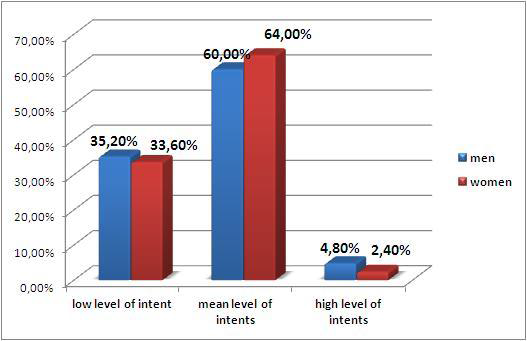No CrossRef data available.
Article contents
P-1436 - Intent to die in Suicide Attempters
Published online by Cambridge University Press: 15 April 2020
Abstract
To evaluate severity of suicide intents and its difference between men and women.
Clinical examination, The Pierce Suicide Intent Scale (SIS).
Suicide attempters over 15 years old admitted to the psychiatric hospital within one month after parasuicide (N = 264; 114 men, 149 women).
Both men and women have the same suicide attempt severity score based on the Piers
Suicide Intent Scale.
[Level of suicide intents in men and women]

Most of suicide attempts (62,1%) were committed in the state of alcohol intoxication. Men had higher prevalence of alcohol intoxication at the time of parasuicide compare to women (70% vs. 56%, ρ< 0,01). Both men and women had statistically reliable lower level of suicide intents in the state of alcohol intoxication compare to those who were in sober state. The difference on the medical risk subscale of the SIS between the “sober” attempters and “alcohol intoxicated” attempters was the strongest (ρ< 0,01).
There is no gender differences in suicide intents among patients admitted to the psychiatric hospital after suicide attempt. Alcohol intoxication is a trigger of parasuicide, while paradoxically it can diminish the level of intent to die and medical risk of self-injury. Partly it can be explained by coexistence of ambivalent wishes to die and to live in one act and sedative effect of alcohol “self-medication”.
- Type
- Abstract
- Information
- Copyright
- Copyright © European Psychiatric Association 2012



Comments
No Comments have been published for this article.